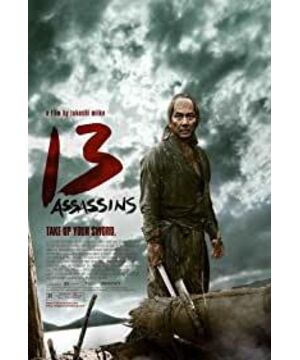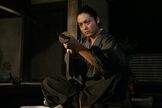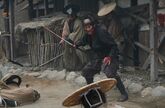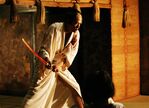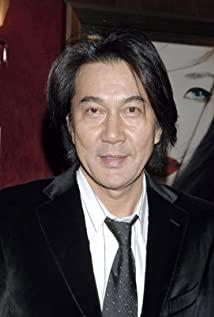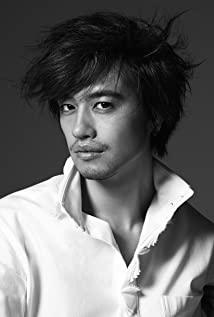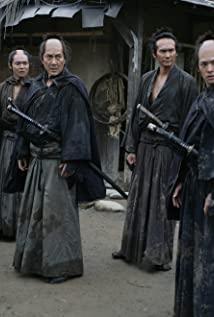To put it simply, both this movie and "The Qingbingwei of Dusk" took place at the end of the shogunate, before the arrival of an era of great change, the last sound of the samurai era. Some people classify this movie and "The Qingbingwei of Dusk" as Japanese period dramas, but I would rather call them martial arts movies from the perspective of mainland China, or, in Japan, call them samurai movies. It's just that "The Qingbingwei of Dusk" tells the life of a samurai as an ordinary person from the perspective of anti-martial arts, while "Thirteen Assassins" by Takashi Miike can be said to be a return to the traditional samurai theme, and it is completely told from beginning to end. A legend of a group of last samurai who acted for the heavens.
It's a remake, but I've never seen the original, so all the guys are chasing Takashi Miike, of course he's a little bit wrong, but as a director, he has the right to make adjustments, so it's not special. wronged. . . . . . Well, start. . . . . .
The idea, the clichés in the clichés -
first of all, I have to say that Miike Takashi actually has the bad taste of blood and hula close-ups in the film, which can be said to be quite restrained - of course, cut a belly at close range, get a Nude women with severed limbs, kicking people's heads, etc. are still inevitable, but given their past performance, these gadgets are basically drizzle in his films. . . . . . It is worth mentioning that the theme of the film - how to say it, when the song ended, it revealed a very strange meaning. It is far less logical, idealistic, sad, helpless, and touching than "Seven Samurai", but it feels similar to when I was a child when I watched the passage of the Water Margin and saw the passage of Liangshan hero being recruited by An Zheng Fangla.
The plot can be said to be quite simple and cliché. At the beginning of the film, it was Mamiya's abdominal incision, which led to the tyrannical and cruel villain Songping Qishao. Doi, the leader of the DPRK, was determined to fight the black and eradicate evil, but because the target was the general's younger brother, he couldn't go through the normal channels, so he recruited Shimada Shinzaemon, the male number one, to execute the assassination plan. Among them, in order to arouse Shimada's sense of justice, Doi showed him a series of heinous crimes by Matsudaira Qishao, including the lonely old man whose son was murdered and his daughter-in-law raped, and the peasant daughter whose limbs were cut off and beheaded. . . . . . This episode is really familiar. We have seen it when we were fighting the landlords, we have seen it at all kinds of Yikusitian hero model reports, and we have also seen it when criticizing old Tibetan monks. Outraged. But wait a minute, let's be a villain for a while, put aside the overflowing sympathy and sense of justice, and ask the last question - what is the relationship between Doi and Matsudaira Qishao? Matsudaira is the general's younger brother and the next candidate for the old middle school, while Doi is the current old middle school, a powerful figure in the shogunate, and the backbone of Gancheng. The relationship between the two is so subtle that it is indescribable. Applying to the history that has been repeated thousands of times in China, the two are the relationship between a relative and Saisuke. The exact opposite. By the way, there was indeed a person in Doi history named Toi Doi, but Matsudaira seems to be a fiction. Fortunately, such tyrannical and perverted bastards emerge in an endless stream in Japanese history, and there is never a lack of blueprints, such as some in the Heian Dynasty. The emperor, such as Toyotomi Hideyoshi's nephew Hideji, and the shogunate Tokugawa family. . . . . . But it is worth noting that these people will never be retributed for their perverted actions, but will only collapse due to political defeat. In this way, Doi's motive for killing Matsudaira becomes suspicious. . . . . . After all, who is a political person without a few blood debts? . . . . . . In this way, Shimada Shinzaemon's behavior has been downgraded from acting for the heavens and killing the people to ordinary killers driven by people - yes, I should not be harsh on these samurai, after all, the direct effect of their behavior is To avenge some oppressed people, and from the inner monologue of Matsudaira in the film, it can be seen that this is a cruel bastard, and it is not wrong to kill, but what I actually want to say is that although the samurai in the film are beyond reproach, Takashi Miike clearly exposed the limitations of excavating profound themes here. On the other hand, in "Seven Samurai" more than 50 years ago, the Kanbei guards fought for the order, justice and the so-called "Tao" they pursued. At the end of the war, the idealistic samurai sighed and the victorious one. It's just those peasants who seem to be humble and wretched; after more than 50 years, who are the New Zaemons fighting for? And who is the final winner? . . . . . . So, when Shinzaemon shouted out the phrase "act for heaven" at the end, I couldn't hold back and let out a wry smile - you can just do it. Gu understands the helplessness of people under the low eaves, and when he shouts this sentence, the image of the wise man is completely destroyed, and he instantly becomes a Boxer. . . . . .
The final chapter of the samurai, the eternal motif -
from "The Thirteen Assassins" to "The Qingbei of Dusk", and even "The Last Samurai", the scene was chosen at the end of the Edo period, and the changes Elegies to a bygone era always seem to move people the most on the eve of their arrival, regardless of the fact that that era is already rotten. . . . . . Ancient and modern, all over the world, this is the case. But let's just let us have a chance to be touched. After all, in this era where even touching can be mass-produced on the assembly line, and it is becoming more and more cheap, things that can truly touch people's hearts can be found but not sought after. ——I just saw a touching series of "Zhiyin Body", and I was disgusted. I took the opportunity to complain a little, and it was far away. . . . . . Come back - in this film, this motif can be said to penetrate quite thoroughly, and I am most impressed by two points: one is the emotion when Shinzaemon was recruiting people, "In this year, which samurai has another What about the fighting experience?” Another is the conversation between Shinrokuro and his uncle when he was hanging around in gambling stalls and Kabukicho. There was no deliberate emphasis on exaggeration, but it revealed a faint sense of loss and confusion, and the taste was very right. . . . . . By the way, Shinrokuro is really the most successful character in the movie. . . . . .
Pale and free figures—
The reason why "Seven Samurai" is often mentioned in the composition is because there are many aspects of this movie that are very similar to "Seven Samurai"--isn't it? Even the name is the same. . . . . . The characters and roles in the film are the same. After careful consideration, among the characters in the film, Shinzaemon, Hirayama Kujuro, Kurunaga Zuoheita, Mihashi Junjiro, Shinrokuro, and Sahara Hirazo are the ones with a little more ink. . . . . . These people (it's funny, I counted the number of people in the movie from the beginning, but I was always counting one less than in the movie, until the end, I only counted twelve, I really don't know if I missed it) Who... I didn't find out that there was another Ishizuka Lipei until I finished looking at the credits. Does anyone know where this product came from? Please tell me so that I can understand.) Among them, the new left The guards are obviously corresponding to the wise and brave, and the position of Kanbei, while the positions of Cang Yong and Sanqiao are equivalent to Gorobei and Qilangji; Hirayama and Sahara are only corresponding to a Kuzang; Kokura is a rookie samurai, equivalent to one of the seven samurai. Katsushiro; the farmer's representative Kikuchiyo, in this film is reincarnated as the hunter Kiga Koyata. As for Otake, Hioki, Tongkou, and Hori, they are simply complete tricks. Only Shinrokuro is a brand new character, and it is also a key role in the film. Heihachi in "Seven Samurai" has no counterpart in this film. . . . . .
It took a long time to compare the character data of these two films at the risk of being troublesome, in order to illustrate that, it seems that the composition of the Thirteen Assassins is still quite large - nearly double the number of others, The number of varieties is almost the same, and the character depiction is not even as delicate and brilliant as "Seven Samurai".
In this, only the uncle and nephew of the protagonist have succeeded or barely succeeded. The characters of the others are not even as three-dimensional and plump as the opposites, Matsudaira and Hanbei. Cangnaga Zuohei appeared inexplicably. I don't know why, Sanqiao is simply the captain of the Dragon Set. The swordsman Pingshan does not have many lines of mentoring and apprenticeship, mainly relying on some mixed points in the fight. Instead, it is the gun king Pingzang, who asks for money first for work, and talks about the use of money at a discount, in a few words, Revealing a little Jianghu spirit, a bit of ancient dragon. . . . . . The most ridiculous is the Orion Xiao Mitai, who is completely in the fog, coming in inexplicably, leaving inexplicable, downright nonsensical. When he came out, he fell from the sky, and in the middle, he single-handedly turned over all the prostitutes and the old ducks of the Ochiai Station. At the end, the sharp blade passed the neck, and the knife was stabbed in the chest. . . . . . It should be said that this fellow is the only legend in the whole film, but he is in a free state - he is a system himself, and is completely different from others. Of course, it is easy enough and enjoyable, but it is completely different from Toshiro Mifune's Kikuchiyo in terms of weight. . . . . .
Likes and dislikes -
there are a lot of successes and failures in this movie, and it's too long, so let's just say a few words at the end.
*I like the two lines when the King of Guns asked for money and when Shinrokuro left home. They are very low-key, but very literary and emotional. The Japanese are very good at this kind of tune. . . . . .
*The most hated scene is the last 13 vs. 200, where the organs are arranged in a condescending position, and the arrows are sent all at once. When the opponent is about 130 or so left, the brothers actually give up the advantageous terrain and long-range weapons, and jump down to fight the enemy. : 10 hand-to-hand combat, I have never seen such two hundred and fifty people, so in the end, people can't feel sympathy at all. You do it yourself, who can you blame. . . . . . The Japanese dogma machinery is exposed, which can be called the biggest failure. . . . . . Of course, the sword formation of the swordsman Hirayama is still very impressive. . . . . .
*The line I hate the most is a line from Zuoheita Cangaga when he persuaded Shinzaemon to accept Kokura - the revolution is regardless of age - please, this is a ten-dead mission. How can this energy be the same as that one! . . . . . .
In general, "Thirteen Assassins" is a good martial arts movie, and it can even be said that it is a very classic martial arts movie. Takashi Miike's storytelling skills are quite impressive, but Takashi Miike is still not Kurosawa. . . . . . According to martial arts movies, four stars, according to art movies, it is only a passing line. . . . . .
View more about 13 Assassins reviews


